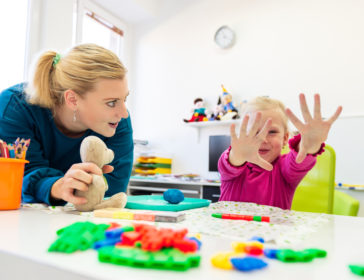
Health
- HONG KONG
Video Interview With ADHD Psychiatrist In Hong Kong
Including FB Live With Dr. Adler

At Little Steps, one of our goals is to keep parents informed of any types of disorders that children might have. We aim to promote knowledge, understanding, and discussion to help parents who may face such situations.
Attention deficit hyperactivity disorder (ADHD) is one of the most common disorders occurring in little humans and teenagers that can also continue into adulthood. It is characterized by difficulties with concentration, focus, and attention which may lead to difficulties with memory, behavior and physical and psychological organization.
We had the pleasure of interviewing Dr. Adler, the director of the Adler Family Centre in Hong Kong. He is a licensed psychologist in the US and received his doctorate in clinical psychology from Yale University. Below we recap some of the key points of that interview to give you a better understanding of ADHD, its treatment and steps parents can take at home and school.
-
What are the key symptoms:
ADHD with a predominance in attention and concentration - The typical symptoms are that your child will have great trouble staying focussed, whether in the classroom or doing their homework. A child will often find it very hard to finish a task or even stay focussed listening to their parents, their teachers or their peers. These symptoms tend to persist in the individual as they grow older.
ADHD with a predominance of hyperactivity - A common symptom is impulsiveness, being hyper, not being able to sit still for even a brief period, and constant fidgeting. These types of symptoms tend to decrease as the child grows into their adolescence.
However, there are also children who exhibit all of the above symptoms, with varying levels of predominance...
Diagnosis:
All the symptoms can be seen in any child, hence it can be difficult to say with certainty whether your child has ADHD. A key element to take into consideration is the age of a child. If you have a toddler at home aged 2 to 4, it is normal for the child to be somewhat hyperactive for example.
A pivotal thing to ask yourself when becoming concerned if your child could have ADHD is whether their behavior is interfering with their day to day life. For example, is it interfering with their social life (family, friends, teachers), or is their behavior interfering with their tasks (homework, chores)?
Accurate diagnosis is crucial, but it is difficult, especially for children as they are constantly evolving. Doctors will formulate their diagnosis on what they observe, and the symptoms of ADHD can also often be related to anxiety or sometimes depression. No diagnosis should be given within 15 minutes because observation is key.
Ideally, the psychiatrist/psychologist/counselor will sit down with the family and discuss what symptoms they are worried about. From there, he/she might observe them in a school setting since the problems are often most visible there. Diagnosis tends to take around 2 weeks. It is essential to do your research and find a qualified psychiatrist/psychologist/counselor that you and your child feel comfortable with.
-
What should the treatment for ADHD include and does it include medication?
If a family decides to see a psychiatrist, it is possible that your child will receive medication. When a child cannot function at home or school, and they are suffering because of it, medication can be the right course of action.
A non-psychiatric approach is to use the diagnosis method as mentioned above and consider using different strategies with the counselor's guidance that can be implemented in the classroom, at home, and during their sessions.
Typical medication for ADHD usually involves the prescription of a stimulant. This might seem paradoxical, but when it comes to ADHD, it often has a calming effect that helps one focus better.
The age when a child is prescribed medication also varies depending on the psychiatrist. It can be prescribed as young as one, but the typical age to start medication would be around 4 to 5. Teens who have ADHD are often also prescribed antidepressants, which also works effectively for ADHD.
Alternative methods:
If parents are reluctant to have their child take medication, there are alternatives that you can discuss with your psychiatrist. One such possibility is the introduction of a strict regimen that can be adopted at home, a schedule that becomes predictable and gives a well-needed structure for the child who has ADHD.
It is also important to be transparent and inform your child why these methods are adopted, how it will benefit them and how crucial it is that the family works as a team.
-
Children who have been diagnosed with ADHD will have the common issue of not being able to cope with any distraction. As a parent, you can provide quiet places at home as well as altering their room in order to minimize distractions so they can do their homework.
At school, some children with ADHD will also need such a space for doing exams, experiments or other occasions where a child's full attention is required. Thus, it is important to discuss this with your school if your psychiatrist suggests this to be an option.
-
Adler Family Centre
Suite 404-405, Stag Building
148 Queens Road Central, Hong Kong
+852 9386 5104
Want More?
Little Steps Asia knows what families need.
Sign up for our email newsletters to get the most out of Asia!
VIDEO: 10 Surprising Facts About The French International School Hong Kong
-
Hong Kong
Hop Aboard The Floating Book Fair Ship Doulos Hope In Hong Kong
Explore A World of Literature & Cultural Connections Aboard The Doulos Hope2024 May 04 - 2024 May 26 -
Hong Kong
Best Family-Friendly Events In Hong Kong – April 2024
Read On For Events Not To Miss In March For Kids And Families In Hong Kong2024 Apr 01 - 2024 Apr 30 -
Hong Kong
Marvel Superheroes Return With Exciting New Shows At Hong Kong Disneyland!
Experience The Ultimate Marvel Adventure With New Shows, Attractions & Heroic Encounters!2024 Apr 26 - 2024 Jun 10 -
Hong Kong
Ministry Of Crab Brings Exclusive Pop-Up Experience To Hong Kong
Fresh Mud Crabs & Freshwater Prawns Flown From Sri Lanka2024 May 03 - 2024 May 19 -
Hong Kong
Celebrate Mother’s Day Aboard The Aqualuna Hong Kong
Dim Sum, Afternoon Tea, Champagne & Flower Planting Workshop2024 May 11 - 2024 May 12 -
Hong Kong
Get Ready To Boogie At Nordic Night – Eurovision Dance Party In Hong Kong
Celebrate A Night of Glitter, Glamour, And Groovy Beats!2024 May 11 - 2024 May 11 -
Hong Kong
Your Guide To Upcoming Concerts In Hong Kong & Macau In 2024
Live Music Performances, Concerts And Festivals You Wouldn't Want To Miss2024 Jan 01 - 2024 Dec 31 -
Hong Kong
INVITE: Attend An Elementary School Campus Tour At Stamford American School Hong Kong
Save The Date: May 162024 May 16 - 2024 May 16 -
Hong Kong
Events & Things To Do On Mother’s Day In Hong Kong 2024
Things To Do On Mother's Day In Hong Kong -
Hong Kong
INVITE: Join A Guidepost Hong Kong Open House
Save The Date - April 202024 Apr 20 - 2024 Apr 20
SIGN UP
Hong Kong Tips, Deals + Events.
Got kids? Little Steps Asia gives you the scoop on all the things to do and see with babies, toddlers, and kids in Hong Kong, Singapore, Kuala Lumpur, Bali, Jakarta, Macau, and beyond. From family-friendly hotels, kids and baby shops, the best schools and after school activities, pregnancy tips and meet-ups and more – we have you sorted.
Sign up to receive the free Little Steps email newsletter packed with news, offers, and hidden treasures for Hong Kong families.
© 2024 Little Steps Asia. All rights reserved.


















